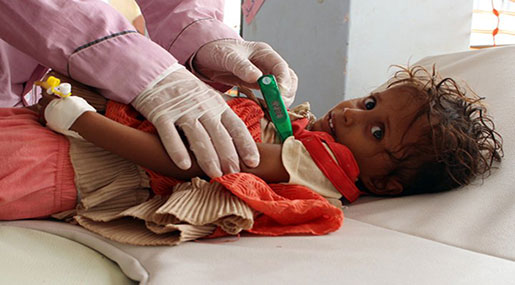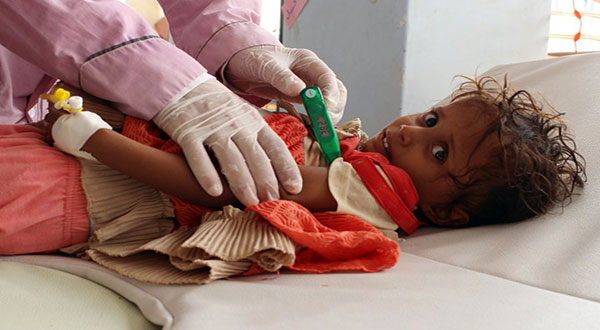
Cholera Is Slaughtering Yemen and We’re Letting It Happen

Laurie Garrett
Since April, more than 350,000 people have come down with cholera in Yemen, which has killed 1,790 of them.

It is an appalling, inexcusable man-made disaster witnessed by a world that seems as impotent to stop the bacteria's spread in the Middle East in 2017 as it was in post-earthquake Haiti in 2010. But the Haitian debacle, in which United Nations Peacekeepers carried the Vibrio cholerae in their bodies from Nepal, passing the bacteria into local streams to spawn a massive epidemic that continues today, spread in a nation shattered by natural disaster.
There is nothing "natural" about the carnage of Yemen: This is war, waged from 10,000 feet by Saudi bombers that have damaged or destroyed every hospital, clinic, water treatment plant, pumping station, and sewer system from Sanaa to Ibb.
According to the World Health Organization [WHO], 14.5 million Yemenis no longer have access to clean water: Cholera is a water-borne disease. UN officials reckon 17 million Yemenis are "one step away from famine," civil war rages across the land, the region is locked in a climate change-compounded record drought, and the country's Arab neighbors feed the flames with steady flows of arms and carpet-bombing campaigns.
Every day the WHO issues a new, always grimmer data set, estimating the toll cholera is taking. Inside the country, humanitarian groups and Yemeni medical personnel stack ailing men, women, and children three and four to a bed, hooking each one up to life-sparing hydration IV drips, even as the sound of gunfire and bombings resonate outside meager facilities.
This is the worst cholera epidemic in modern history, and it has already spread well beyond the borders of Yemen, though neighboring nations decline to officially report "cholera," preferring the ambiguous phrase, "acute watery diarrhea." Even the new director general of the WHO, Tedros Adhanom Ghebreyesus, plays the name game, as the former Ethiopian health minister shuns the disease moniker that inspires regional economic boycotts and keeps tourists away. Having personally suffered a dreadful bout of "watery diarrhea" years ago in Egypt, I know cholera is in the Nile, and I've felt how intolerable the cholera deception is. The acute physical pain that the water-sucking bacteria cause is almost indescribable. I have often recounted that had somebody walked into my room when I was in the throes of cholera's worst and shot me, my final words would have been, "Thank you."
Confronting this catastrophe commands honesty: Cholera is now rampant not only in Yemen, but South Sudan, Ethiopia, Kenya, Somalia, Sudan, and in refugee camps across the Middle East. Last month, the disease broke out in a luxury hotel in Nairobi, sickening attendees to a health conference. By that time, UNICEF head Anthony Lake said, the Yemen disaster was growing by 5,000 new cases per day-a pace it has since well exceeded. The true toll may well reach half a million before July ends, and the agony is evident everywhere one looks.
The horrible irony is that cholera is spreading primarily because Saudi Arabia and its Gulf state allies have been bombing Yemen's infrastructure to smithereens for months, rendering every water supply contaminated. The reluctance of Ethiopia and other cholera-afflicted nations to truthfully state their health plights is due to the same countries'-Saudi Arabia and its Gulf allies-policies of boycotting all trade and food from nations that admit to having the disease. And historically the greatest scourge of the annual Hajj is-you guessed it-cholera. On July 14, the WHO actually released a statement praising Saudi Arabia for its "preparedness" for the upcoming Hajj, given the near-100% likelihood that some pilgrims from the region will be infected with the bacteria, potentially spreading the nightmare in Mecca.
There is, of course, a vaccine for cholera, and the UN system geared up after the Fourth of July to vaccinate a half-million Yemenis in a heroic mass immunization campaign. The need was 20 million doses, but the world stockpile of cholera vaccine had been allowed to dwindle, and manufacturers, put off by low profit margins, stopped making the life-saving medicine. Vaccinators hoped to target meager supplies wisely, and slow the epidemic's spread.
But on July 13 the WHO canceled vaccine shipments. The Saudis had refused to guarantee a ceasefire, which would have allowed the UN safe passage and a few days' window of immunization possibility.
So here we are, in the 21st century, haplessly watching an ancient scourge slaughter innocents and spread inexorably across a region untouched by modern science and public health. Shame on all of us.
Source: Fortune.com, Edited by website team
Comments



